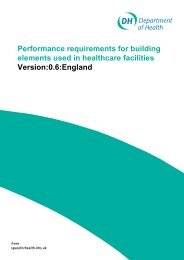Early Life Nutrition and Lifelong Health - Derbyshire Local Medical ...
Early Life Nutrition and Lifelong Health - Derbyshire Local Medical ...
Early Life Nutrition and Lifelong Health - Derbyshire Local Medical ...
You also want an ePaper? Increase the reach of your titles
YUMPU automatically turns print PDFs into web optimized ePapers that Google loves.
BMA Board of ScienceBlood pressure <strong>and</strong> cardiovascular diseaseThere were no differences in blood pressure at six years of age between children in the two arms ofthe Belarus trial. 180 Two recent systematic reviews 197, 198 found that breastfeeding was associated with asmall reduction in blood pressure of 1-1.5 mmHg (systolic) <strong>and</strong> 0.5 mmHg (diastolic) in observationalstudies. Effect estimates were lower after adjusting for confounding. Although small in individualterms, an effect of this size at a population level could translate into significant reductions inhypertension <strong>and</strong> CHD. A meta-analysis of the few studies that have related infant feeding tocardiovascular disease found no evidence of a lower incidence in men <strong>and</strong> women who werebreastfed. 199 There was some evidence that prolonged breastfeeding (for more than a year) wasassociated with a small increase in adult cardiovascular disease mortality in this analysis, <strong>and</strong> withincreased arterial stiffness in one other cohort study. 200Other cardiovascular risk factorsThere are few data for other risk factors such as serum lipid concentrations <strong>and</strong> inflammatory markers. Ameta-analysis found that breastfed babies have higher serum cholesterol <strong>and</strong> low-density lipid (LDL)cholesterol concentrations in infancy itself (probably because of the higher cholesterol content in breastmilk) but concentrations were lower in adult life by -0.18 mmol/l (CI -0.3 to -0.06). This difference wouldbe associated with an approximate 10 per cent reduction in CHD risk. 201 Consistent with these findings, ina follow up study of pre-term infants r<strong>and</strong>omly assigned to banked breast milk or pre-term formula,children in the former group had lower LDL cholesterol <strong>and</strong> apolipoprotein B concentrations. 202 A recentstudy of 8,000 members of the 1958 UK birth cohort, whose infant feeding was recalled by the motherat seven years, <strong>and</strong> in which it was possible to adjust for confounding factors, showed that a longerduration of breastfeeding was associated with lower plasma fibrinogen, plasminogen activator inhibitor<strong>and</strong> von Willebr<strong>and</strong> factor, although the effects were small. 203CancerHigher birth weight <strong>and</strong> taller adult height are associated with an increased risk of some cancers,suggesting effects of nutrition in early life. 19 This may reflect exposure to hormones promoting earlygrowth. A recent meta-analysis suggested reduced rates of pre-menopausal breast cancer amongwomen who were breastfed in infancy, but found no evidence of an effect on overall cancer incidenceor other specific adult cancers. 204 There may be small reductions in some childhood cancers, includingacute lymphoblastic leukaemia, Hodgkin’s lymphoma, <strong>and</strong> neuroblastoma, but data are limited. 205Allergic/atopic diseaseThe incidence of allergic disease in infancy <strong>and</strong> childhood (wheezy bronchitis, asthma <strong>and</strong> atopicdermatitis or eczema) has increased recently in many Western countries including the UK. Severalstudies have suggested a protective effect of breastfeeding, but systematic reviews show that thefindings are inconsistent. Infants at high risk because of a family history of allergic disease do seem tobenefit from exclusive breastfeeding for three to four months. 206 Soya-based formula does not protectagainst atopic disease, but there is some evidence that hydrolysed formulas are protective comparedwith formula containing intact bovine protein. 206Mental healthOne of the proposed benefits of breastfeeding is increased bonding between mother <strong>and</strong> baby, <strong>and</strong> anincreased sense of security that could promote psychosocial resilience <strong>and</strong> reduce mental illness. This isa remarkably poorly studied outcome. Fergusson found no evidence of better psychosocial adjustmentin adolescents who were breastfed, 207 while another small study suggested lower anxiety levels inresponse to parental separation in breastfed children. 208<strong>Early</strong> life nutrition <strong>and</strong> lifelong health 43



